These past eight weeks, as I have been doing readings of and interviews for my new book Divining, a Memoir in Trees, I’ve been surprised by how many people have been eager to share their own tree stories.
One of those people was writer Maureen Shaughnessy. This week, I’ve invited “Maureen S.” to share one of her tree stories with you.
Introducing Writer Maureen Shaughnessy
When I asked her to give me a short bio so that I could properly introduce her, she complied with modesty and mischievousness:
My storytelling career began at age ten when I wrote, directed, and starred in a driveway production of Rumpelstiltskin with my neighborhood pals. We made eighty dollars. I’m still at it but have yet to surpass my early success.
–Maureen Shaughnessy
I happen to know Maureen has had at least two pieces published in the “Readers Write” section of The Sun Magazine. No small feat. The topics for those two monthly issues were “Ghosts” and “Making Love.” (I dare you not to click on the latter link; if you want to read Maureen’s piece, you’ll have to read–or scroll through–a few other stories about making love–or experiencing ghosts if you click on the former link–first.)
Currently, Maureen is beginning a second draft of her literary novel Not Dead Yet.
Willow Wands
by
Maureen Shaughnessy
This bowl of earth cradling the lake is my home place. Its gentle south-facing slopes have soothed and fed me for decades.
Today, I stand rooted to a spot at the crest of a hill, looking down over what has always been–but never felt like–the property line. I’m staring in dismay at the tracks made by the treads of bulldozers and other heavy machines. They are quiet for now, but along the shore, two big willow stumps protrude from the spring mud like partly buried bones left by giant, careless dogs.
“Willows are so messy,” my new neighbor had said when I tried to speak to her on behalf of sparing those graceful old trees.
All but one of the many mature oaks and maples have been chainsawed and bulldozed. Now they’re strewn around, or heaped in chaotic piles, awaiting the chipper.
The urge to walk down and investigate the carnage pulls at me. I want to pay my condolences to the trees, but something holds me back. The equipment is parked, after all. And, I reason, no one’s around to see me “trespass” on the new neighbors’ land.
As I head down to the shore, a memory, as buried as the roots beneath these stumps, comes floating up to me from my childhood.
My Childhood Memory
I was seven years old. It was full summer and had been a hot morning when the weather suddenly changed. My mother called us in as a loud siren went off from somewhere over by the school. The sky was turning greenish-black. I turned around to check that my little sisters were leaving the sandbox too. The three of us ran toward the house. The wind picked up as we piled in through the screen door our mother was holding open. My two brothers were running around to the front of the house, baseball equipment in hand.
Taking Shelter
“We’re going to the basement,” she said.
“That was the tornado siren, wasn’t it?” asked Jack.
“Where’s Sandy?” came Kate’s plaintive question. “Here kitty, kitty. Saaaaandy. Saaaaaandy. Saaaandy!”
“Just get down the stairs. Now,” our mother said in her no-nonsense voice. The boys dropped the bat and mitts they were holding and hurried into the house. I took Kate by the hand as my mother picked up the baby, Elizabeth, and herded us down the steps. Crying, Kate kept calling for her cat to come.
The low basement windows offered a limited view of the ground and a foot or so above it. Standing on a chair, I could see the grass blowing flat, and off in the distance, the plants and trees bowing low. Kate’s howling was increasing in volume with the wind.
“I’ll go up and see if I can find the cat,” our mom said, taking the stairs two at a time. As she reached the landing and unlatched the side storm door, the whole thing ripped out of her hand. Glass shattered. Branches slammed against the house as she struggled to close the main door. I couldn’t tell if the screaming came from my own mouth, from the other children, or from the wind. Mom tumbled back down the stairs unhurt.
“Get away from the windows,” she yelled, but I couldn’t tear my eyes away from the ground-level scene of trees hitting the dirt like flipped dominoes. The doghouse was gone. Then the basement lights went out, and it was so dark outside, we couldn’t see anything for a while. My mother fumbled over to Dad’s workbench and found a flashlight. As she clicked it on, she slid the weak beam over the faces of each of us kids. Kate’s face was tear-streaked and snotty, so she went to her first. Lifting Kate into her arms, she sat, dropping into the old chair. Kate was only four and hadn’t yet started school. My brothers and I had experienced sirens and tornado drills at school. We had seen The Wizard of Oz. Kate was still crying, but more softly now.
What the Tornado Spared
The green color had faded from the sky, and the rain had passed. It was weirdly quiet outside. We sat in the dim basement for a while, and then we heard a faint mewing at the top of the stairs. Kate tried to wiggle from our mother’s arms.
“Sandy!” she cried.
“You stay put. I’ll go check on the cat,” our mother said.
She came back down the stairs holding a bedraggled but intact cat away from her clothes. Kate had no such compunction about getting wet and embraced the cat with undampened joy. Kate’s relief was contagious. We all danced around her and the drenched feline.
A Topsy-Turvy World
Mother went up to find the radio as a siren shrieked. “That was the all-clear siren. Come up, but don’t anyone go outside until I say so. Do you all hear me?”
As we emerged from the basement, we heard her speaking to our father on the phone. It sounded like he was heading home from work but was unsure about the roads. Mother stepped out onto the front porch to assess the damage, and the five of us squeezed out next to her.
It was quiet, and the air felt soft. The trees, so many trees, lay horizontal upon the earth with their roots exposed, huge discs of them tipping up like crashed flying saucers. The massive oaks still stretched out their giant arms, but they were now laid low and newly reachable. We begged our mother to let us climb up into their wet, green limbs.
“No,” she said. “Stay with me. We need to check on the neighbors.” The eerie silence was broken by the sound of emergency-vehicle sirens. Neighbors came out too, everyone climbing over the branches, exploring the uncanny and chaotic scene.
Carrying Elizabeth, Mother set out through the soaked grass, plotting a course that avoided the trunks of the big trees strewn over the yards. As the neighborhood women began to talk, my brothers and I slipped away to explore this newly created topsy-turvy world.
The fishing shanty in the yard behind our back fence had been ripped in two, one half left standing open. We marveled that the shelves we children had installed to make a playhouse were still primly standing, filled with intact little pitchers and teacups. The other half of the shanty was nowhere to be seen. The carport was blown flat and had been carried across the yard. While the car looked okay, the fence next to it was down, resembling large spilled toothpicks.
We climbed up and perched on one of the reachable branches. From that lookout, we could see the path of the tornado, the trees uprooted on the road behind our house as if a giant had pulled up a row of turnips.
The boys and I wandered back home, and I asked Kate to come with me to check on our forts in the swamp. Kate was tired from all the excitement and the strain of temporarily losing her cat, but she agreed.
What the Tornado Took
We walked down the middle of the road, amazed that now we could go where cars could not. We came to the opening to the swamp, where the plants had been pruned by the deer and broken by children seeking the springs and vernal ponds deeper in the wetland. I took Kate’s hand, holding onto her except where we had to walk one behind the other. As we came out into a clearing, I gasped in horror. There, on her side, with her roots strangely tipped out of the earth, was the oldest tree in the neighborhood. This massive willow was secretly called “Grandmother Willow” by my sisters, me, and our tree-climbing girlfriends.
I sat, breathless, on the nearest dry branch. Tears sprang unexpectedly to my eyes as Kate looked on, her eyes wide. Although she reserved much of her tenderness for domesticated animals, my sweet sister understood my interest in insects, amphibians, and reptiles. She knew, from the unavoidable intimacy of being a close-in-age younger sister, how I loved trees, sang to them, and felt able to speak with certain trees in our neighborhood. We sat near the fallen matriarch of the swamp for a while, in quiet wonder, and I composed myself enough to stand up, walk over and embrace the massive trunk of my old friend. I rested my cheek there. I looked out along the broken branches.
The chartreuse, lance-shaped leaves were glistening as they hung at odd angles. I caressed the bunches of leaves, admiring them and kissing them, thinking of all the willow crowns we’d made from braiding these whip-like branches. “I will come back with some clippers,” I said, half to myself, “and maybe I can gather some branches for baskets or wreaths.” I immediately felt disloyal for contemplating a harvest when this majestic tree was still in the process of realizing that it had been snatched out of the earth.
“Let’s go home,” I said, and Kate stood up quietly, respectful of my sorrow. The two of us walked home without speaking.
More Than Fifty Years Later
Over fifty years have passed since that long-forgotten morning. Now I stand, looking sadly down at the tall stump of the willows that had graced the shoreline near my home for all these seasons. The weather has been unseasonably cold this month. The sap had just started to rise, to fill the willows’ branches and twigs with their mysterious citrine glow. Now the shoreline is stripped bare.
I wonder, now, if it was willow-love that first led me to this place. The young willow still growing on my side of the property line is certainly the offspring of one of these mother trees that have been so rudely cut down.
The Magic
I make a decision. I go fetch my pruners from the garden shed and step over the black plastic construction fence on the property line.
I walk down to the shore and greet the fallen trees. I thank them and say farewell. Then I clip a few little twigs, asking for their life to carry on. I go in and stick them in a pot of soil in my kitchen.
Today, they look to be beginning–possibly–to take root.
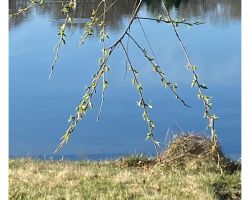
P.S. From “Maureen D.”
Thank you for sharing your story and photographs, “Maureen S.,” guest blogger extraordinaire!
P.S.S. Willow How-to
For information on how you can successfully start your own willow tree, see: “How to Propagate Willow Trees.”


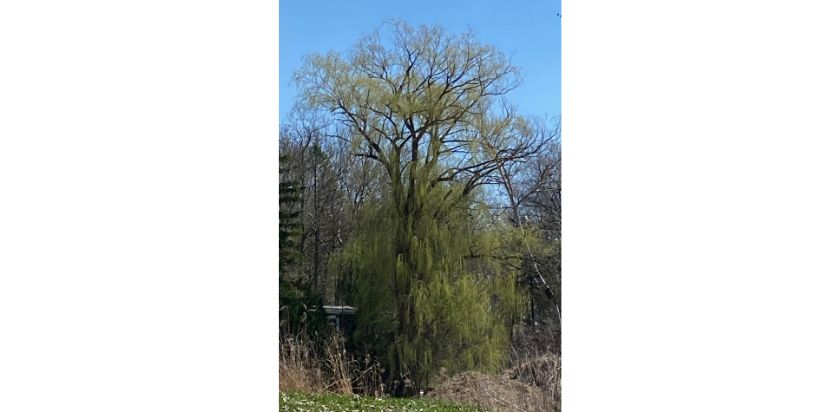

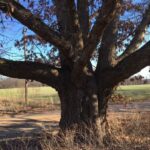
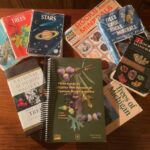
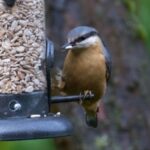


Maureen S, just wonderful rendering of a child’s love of trees segueing into an adult’s love, then pain when a tree is destroyed, not by nature but by a mind-numbingly insensitive neighbor. Beautiful description!